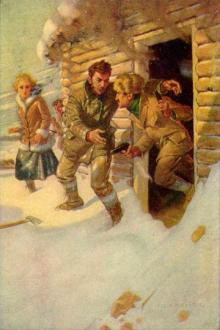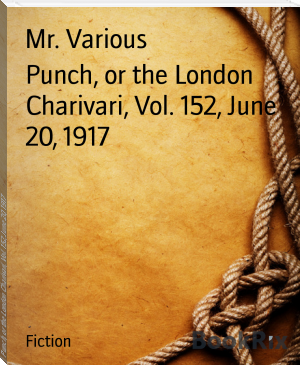The Gun-Brand by James B. Hendryx (thriller book recommendations .TXT) 📕

- Author: James B. Hendryx
- Performer: -
Book online «The Gun-Brand by James B. Hendryx (thriller book recommendations .TXT) 📕». Author James B. Hendryx
For social triumphs the girl cared nothing. The heart of her felt the irresistible call of the raw. She returned to the land of her birth and deliberately, determinedly, in the face of opposition, ridicule, advice, and command—as Tiger Elliston, himself, would have done—she cast about until she found the raw, upon the rim of the Arctic. And, with the avowed purpose of carrying education and civilization to the Indians of the far North, turned her back upon the world-fashionable, and without fanfare or trumpetry, headed into the land of primal things.
When the three women had taken their places in the head scow, Vermilion gave the order to shove off, and with the swarthy crew straining at the rude sweeps, the heavy scows threaded their way into the North.
Once through the swift water at the tail of Slave Rapids, the four scows drifted lazily down the river. The scowmen distributed themselves among the pieces in more or less comfortable attitudes and slept. In the head scow only the boss and the three women remained awake.
"Who is Pierre Lapierre?" Chloe asked suddenly.
The man darted her a searching glance and shrugged. "Pierre Lapierre, she free-trader," he answered. "Dees scow, she Pierre Lapierre scow."
If Chloe was surprised at this bit of information, she succeeded admirably in disguising her feelings. Not so Harriet Penny, who sank back among the freight pieces to stare fearfully into the face of the younger woman.
"Then you are Pierre Lapierre's man? You work for him?"
The man nodded. "On de reevaire I'm run de scow—me—Vermilion! I'm tak' de reesk. Lapierre, she tak' de money." The man's eyes glinted wickedly.
"Risk? What risk?" asked the girl.
Again the man eyed her shrewdly and laughed. "Das plent' reesk—on de reevaire. De scow—me'be so, she heet de rock in de rapids—bre'k all to hell—Voilà!" Somehow the words did not ring true.
"You hate Lapierre!" The words flashed swift, taking the man by surprise.
"Non! Non!" he cried, and Chloe noticed that his glance flashed swiftly over the sprawling forms of the five sleeping scowmen.
"And you are afraid of him," the girl added before he could frame a reply.
A sudden gleam of anger leaped into the eyes of the half-breed. He seemed on the point of speaking, but with an unintelligible muttered imprecation he relapsed into sullen silence. Chloe had purposely baited the man, hoping in his anger he would blurt out some bit of information concerning the mysterious Pierre Lapierre. Instead, the man crouched silent, scowling, with his gaze fixed upon the forms of the scowmen.
Had the girl been more familiar with the French half-breeds of the outlands she would have been suspicious of the man's sudden taciturnity under stress of anger—suspicious, also, of the gradual shifting that had been going on for days among the crews of the scows. A shifting that indicated Vermilion was selecting the crew of his own scow with an eye to a purpose—a purpose that had not altogether to do with the scow's safe conduct through white-water. But Chloe had taken no note of the personnel of the scowmen, nor of the fact that the freight of the head scow consisted only of pieces that obviously contained provisions, together with her own tent and sleeping outfit, and several burlapped pieces marked with the name "MacNair." Idly she wondered who MacNair was, but refrained from asking.
The long-gathering twilight deepened as the scows floated northward. Vermilion's face lost its scowl, and he smoked in silence—a sinister figure, thought the girl, as he crouched in the bow, his dark features set off to advantage by his flaming head-band.
Into the stillness crept a sound—the far-off roar of a rapid. Sullen, and dull, it scarce broke the monotony of the silence—low, yet ever increasing in volume.
"Another portage?" wearily asked the girl.
Vermilion shook his head. "Non, eet ees de Chute. Ten miles of de wild, fast wataire, but safe—eef you know de way. Me—Vermilion—I'm tak' de scow t'rough a hondre tam—bien!"
"But, you can't make it in the dark!"
Vermilion laughed. "We mak' de camp to-night. To-mor', we run de Chute." He reached for the light pole with which he indicated the channel to the steersman, and beat sharply upon the running-board that formed the gunwale of the scow. Sleepily the five sprawling forms stirred, and awoke to consciousness. Vermilion spoke a guttural jargon of words and the men fumbled the rude sweeps against the tholes. The other three scows drifted lazily in the rear and, standing upon the running-board, Vermilion roared his orders. Figures in the scows stirred, and sweeps thudded against thole-pins. The roar of the Chute was loud, now—hoarse, and portentous of evil.
The high banks on either side of the river drew closer together, the speed of the drifting scows increased, and upon the dark surface of the water tiny whirlpools appeared. Vermilion raised the pole above his head and pointed toward a narrow strip of beach that showed dimly at the foot of the high bank, at a point only a few hundred yards above the dark gap where the river plunged between the upstanding rocks of the Chute.
Looking backward, Chloe watched the three scows with their swarthy crews straining at the great sweeps. Here was action—life! Primitive man battling against the unbending forces of an iron wilderness. The red blood leaped through the girl's veins as she realized that this life was to be her life—this wilderness to be her wilderness. Hers to bring under the book, and its primitive children, hers—to govern by a rule of thumb!
Suddenly she noticed that the following scows were much nearer shore than her own, and also, that they were being rapidly out-distanced. She glanced quickly toward shore. The scow was opposite the strip of beach toward which the others were slowly but surely drawing. The scow seemed motionless, as upon the surface of a mill-pond, but the beach, and the high bank beyond, raced past to disappear in the deepening gloom. The figures in the following scows—the scows themselves—blurred into the shore-line. The beach was gone. Rocks appeared, jagged, and high—close upon either hand.
In a sudden panic, Chloe glanced wildly toward Vermilion, who crouched in the bow, pole in hand, and with set face, stared into the gloom ahead. Swiftly her glance travelled over the crew—their faces, also, were set, and they stood at the sweeps, motionless, but with their eyes fixed upon the pole of the pilot. Beyond Vermilion, in the forefront, appeared wave after wave of wildly tossing water. For just an instant the scow hesitated, trembled through its length, and with the leaping waves battering against its bottom and sides, plunged straight into the maw of the Chute!
Down, down through the Chute raced the heavily loaded scow, seeming fairly to leap from wave to wave in a series of tremendous shocks, as the flat bottom rose high in the fore and crashed onto the crest of the next wave, sending a spume of stinging spray high into the air. White-water curled over the gunwale and sloshed about in the bottom. The air was chill, and wet—like the dead air of a rock-cavern.
Chloe Elliston knew one moment of swift fear. And then, the mighty roar of the waters; the mad plunging of the scow between the towering walls of rock; the set, tense face of Vermilion as he stared into the gloom; the laboured breathing of the scowmen as they strained at the sweeps, veering the scow to the right, or to the left, as the rod of the pilot indicated; the splendid battle of it; the wild exhilaration of fighting death on death's own stamping ground flung all thought of fear aside, and in the girl's heart surged the wild, fierce joy of living, with life itself at stake.
For just an instant Chloe's glance rested upon her companions; Big Lena sat scowling murderously at Vermilion's broad back. Harriet Penny had fainted and lay with the back of her head awash in the shallow bilge water. A strange alter ego—elemental—primordial—had taken possession of Chloe. Her eyes glowed, and her heart thrilled at the sight of the tense, vigilant figure of Vermilion, and the sweating, straining scowmen. For the helpless form of Harriet Penny she felt only contempt—the savage, intolerant contempt of the strong for the weak among firstlings.
The intoxication of a new existence was upon her, or, better, a world-old existence—an existence that was new when the world was new. In that moment, she was a throw-back of a million years, and through her veins fumed the ferine blood of her paleolithic forebears. What is life but proof of the fitness to live? Death, but defeat.
On rushed the scow, leaping, crashing from wave to wave, into the Northern night. And, as it rushed and leaped and crashed, it bore two women, their garments touching, but between whom interposed a whole world of creeds and fabrics.
Suddenly, Chloe sensed a change. The scow no longer leaped and crashed, and the roar of the rapids grew faint. No longer the form of Vermilion appeared couchant, tense; and, among the scowmen, one laughed. Chloe drew a deep breath, and a slight shudder shook her frame. She glanced about her in bewilderment, and, reaching swiftly down, raised the inert form of Harriet Penny and rested it gently against her knees.
The darkness of night had settled upon the river. Stars twinkled overhead. The high, scrub-timbered shore loomed formless and black, and the flat bottom of the scow rasped harshly on gravel. Vermilion leaped ashore, followed by the scowmen, and Chloe assisted Big Lena with the still unconscious form of Harriet Penny. As if by magic, fires flared out upon the shingle, and in an incredibly short time the girl found herself seated upon her bed-roll inside her mosquito-barred tent of balloon silk. The older woman had revived and lay, a dejected heap, upon her blankets, and out in front Big Lena was stooping over a fire. Beyond, upon the gravel, the fires of the scowmen flamed red, and threw wavering reflections upon the black water of the river.
Chloe was seized with a strange unrest. The sight of Harriet Penny irritated her. She stepped from the tent and filled her lungs with great drafts of the spruce-laden night-breeze that wafted gently out of the mysterious dark, and rippled the surface of the river until little waves slapped softly against the shore in tiny whisperings of the unknown—whisperings that called, and were understood by the new awakened self within her.
She glanced toward the fires of the rivermen where the dark-skinned, long-haired sons of the wild squatted close about the flames over which pots boiled, grease fried, and chunks of red meat browned upon the ends of long toasting-sticks. The girl's heart leaped with the wild freedom of it. A sense of might and of power surged through her veins. These men were her men—hers to command. Savages and half-savages whose work it was to do her bidding—and who performed their work well. The night was calling her—the vague, portentous night of the land beyond outposts. Slowly she passed the fires, and on along the margin of the river whose waters, black and forbidding, reached into the North.
"The unconquered North," she breathed, as she stood upon a water-lapped boulder and gazed into the impenetrable dark. And, as she gazed, before her mind's eye rose a vision. The scattered teepees of the Northland, smoke-blackened, filthy, stinking with the reek of ill-tanned skins, resolved themselves into a village beside a broad, smooth-flowing river.
The teepees faded, and in their place appeared rows of substantial log cabins, each with its door-yard





Comments (0)